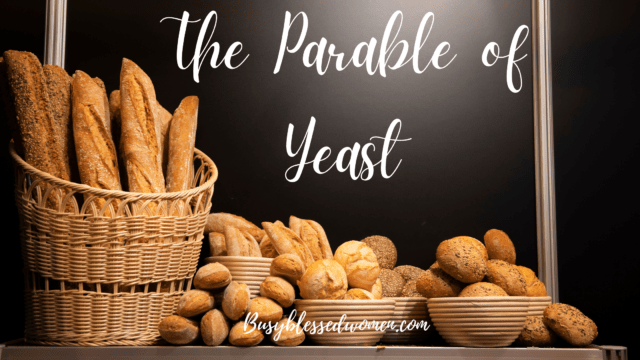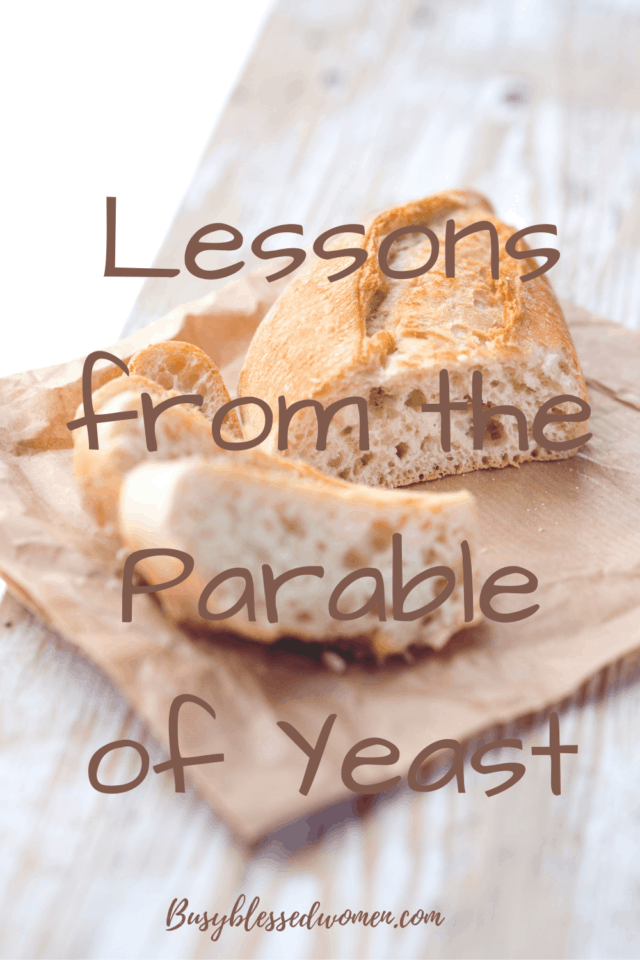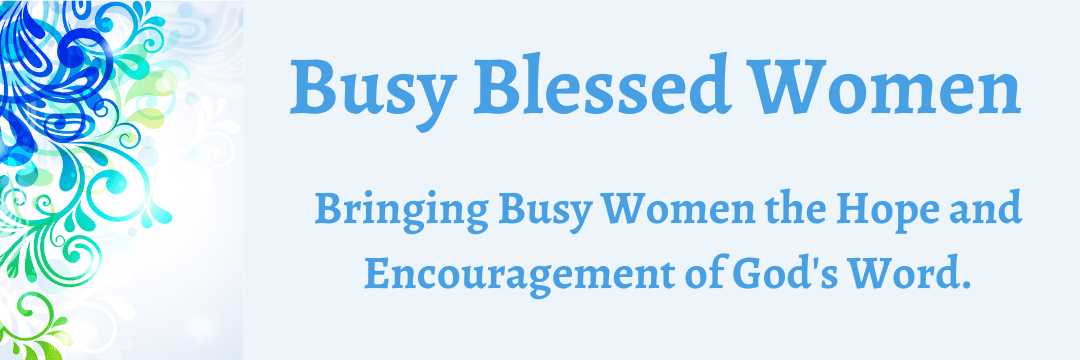Jesus used the parable of yeast in a few places in the Bible. It always symbolizes great growth. The metaphor must have stuck with His disciples as I came across this use of the word yeast while I was meandering through scripture: “You were running a good race. Who cut in on you and kept you from obeying the truth? That kind of persuasion does not come from the one who calls you. A little yeast works through the whole batch of dough.” Galatians 5:7-9NIV.

Hmmm. Now that’s an interesting way to make a point. Men certainly weren’t baking bread in those days, so why use that metaphor? There are actually 58 passages related to yeast in Scripture. Jesus used examples of “leaven” (yeast) in His teachings, so it was a topic that was more well known than I thought.
What Did Jesus Say about Yeast?
In Luke 13:20-21NIV Jesus taught this parable of yeast: “What shall I compare the kingdom of God to? It is like yeast that a woman took and mixed into a large amount of flour until it worked all through the dough.”
A small spoonful of yeast can cause bread dough to double in size. Likewise, Jesus’s kingdom would start small and grow much larger; blossoming until the whole world was impacted. The yeast is seen as a positive symbol of great growth!
When the word “yeast” is used in the bible, it can also be symbolic of sin or false teaching as seen in the Galatians verse above. To help explain why Jesus used this term, I decided to add to my knowledge of biblical bread making.
How Was Yeast made in Biblical Times?
The ladies of Bible times did not have yeast as we know it. They mixed up flour and water and added a tiny bit of leftover dough, the starter, from previous baking. The dough was sometimes left out to absorb the yeasts (fungus spores) that are naturally in the air. They could also remove the ‘bloom’ off of the grapes or grape leaves that contained natural yeast cells by washing them in water, mixing it with a bit of fruit and wait for it to ferment.
Thank goodness for Louis Pasteur who figured out fermentation in 1857 and made our lives much easier. Hey, you can’t say you don’t learn some stuff while reading my blog!
Why Is Yeast a Symbol of Sin?
Back to Jesus. Let’s look at another parable about yeast. We’ll start with Luke 12:1. Jesus was speaking to his disciples and said, “Be on your guard against the yeast of the Pharisees, which is hypocrisy.” The Pharisees were pretenders. Outwardly, they sounded religious, but inwardly, they had no regard for the spiritual or physical well-being of the people.
The Yeast of the Pharisees
They were spreading their “yeast” of bad moral influence that contaminated the people’s minds.
Jesus spoke of the yeast of the Sadducees as well in Matthew 16. They had come to test Jesus and ask for a “sign.” He rebukes them and leaves. He tells his disciples to beware of the yeast of the Sadducees. Again, the idea of spreading their false doctrines (denying the resurrection, and the immortality of the soul for starters) could keep many from following Christ.
In Paul’s case in the above Galatians verse, the sin of the Jewish Christians was also spreading false teachings to other Christians. Like yeast, it will grow and work its way through all it comes in contact with.
Sin is Like Yeast
So there you have it- sin is a deceptive, creeping entity that can start small but grow into a bigger issue. What’s a sinner to do?

The Feast of Unleavened Bread
God gives us the answer in the Feast of the Unleavened Bread. It was so important that God made it a seven day Feast. Not just a day or a weekend, a whole week. It’s actually the first day of Passover (which lasts only 24 hours.)
The Feast commemorates the Israelites leaving Egypt so quickly in the middle of the night that they didn’t have time to add yeast to their bread. For the entire seven days of the feast, they eat only unleavened bread. Not only that, they are to start the festival by thoroughly removing every trace of leaven in their home. Since leaven (yeast) is symbolic of sin, this was a time of reflection and repentance for them and the “removal” of sin from their lives.
Meaning of Unleavened Bread
The Feast of Unleavened Bread symbolizes how we are to live.
For starters, we have to recognize the sin in our lives. That takes introspection. We are to actively seek out the sin that is creeping into our lives. Look into every nook and cranny of our hearts and sweep it away. Resist temptation when it strikes. Shut it down quickly before it can become sin. Find whatever prayer or action that works for you to turn from the temptation.
Finally, when we do sin, ask for forgiveness immediately. Spend time with God, remembering all He has done for us.
Related Post∼ Confession of Sin
Here’s one of my favorite verses that perfectly describes our dilemma:
“I want to do what is right, but I can’t. I want to do what is good, but I don’t. I don’t want to do what is wrong, but I do it anyway. Romans 7:18-20
And it continues in verse 25: “Who will free me from this life that is dominated by sin and death? Thank God! The answer is Jesus Christ our Lord.”
We’ll never be perfect, but a healthy respect for the insidious nature of sin can keep us in check. Keep in mind then when we became Christians, we repented of our sins and received the Holy Spirit! He lives in us and He will help us live righteous lives.
Think of that the next time you eat a sandwich!
Blessings!
AnnMarie
All Scripture is taken from the NIV unless specified otherwise.
Photo Credit: Canva

So cool how many people got to this blog. It’s a trending topic! I came here because we just did a science experiment. We added boiling water to yeast and sugar. It made the balloon implode on itself!!! And it’s making me ponder. It’s not just the yeast! It’s what the yeast is added into or added with that creates the reactions! Sin with legalism creates what? Sin mixed with love and grace and compassion I would say reacts into forgiveness and reconciliation! Sin mixed into hurt and pain and wounded ness creates an insane chemical reaction that I am sure we are all well aware of!!! But what makes the balloon implode? That’s my guess- unhealed wounds mixed with sin (yeast) from another person causes the implosion on self and relationship- destruction at its best.
What awesome insights, Bethany! I love them! It’s a fascinating subject 🙂
I came across this blog after watching a YouTube video of an interview with Connie Frisbee, Lonnie Frisbee’s ex-wife from Jesus Revolution. She described the church today as “yeast” I thought it was interesting that she used that word and decided to look it up.
This blog definitely answered my question as to why she used that word. But also, yes, I got an added wrinkle to my brain when you explained how yeast was made back then. It also made me think of the Amish Friendship Bread Starter recipe. It’s a recipe that keeps growing and is shared.
Hi Debbie! I had fun researching for that post! I’ve been a bread maker for years and even had a friend bring me a bag of starter once! She also brought a recipe for a loaf that had a cinnamon sugar topping that was scrumptious!!
But back to yeast… I do love how our Lord uses simple everyday terms to help us understand the important concepts we need to know!
Great topic. I came here because just started the course Zúme training (https://zume.training). Zúme means yeast.
God bless you!
I’m so glad it connected with you. I just checked out the Zume course- it sounds wonderful! God bless you in this journey!
I have been edified thanks for sharing the word of God and enabling me get out of my confusion.
I’m so glad this clarified your confusion! All praise to Him who sits on the throne- forever and ever! God bless you Sarah!
It seems that yeast can be considered evil or good. A little goodness can grow the kingdom of God as well as sin can grow causing much harm. Put the flour mixture in the oven and it developes into a beautiful bread.
Absolutely! And sometimes a little “heat” in the form of a trial can lead to a beautiful, full loaf if we use the yeast as He intends 🙂
Thank you so much for sharing this knowledge. I currently am in a spiritual and soul seeking transformation, mainly escaping as they say today “the matrix” and to not have that yeast affect me nor distract me any longer as it does so many. Coincidentally I just started making bread and wanted to search in the Bible if yeast is spoken about in good context to filter out what is good vs bad for us to consume. I found my answer on top of helping my soul search as well. Thank you again, this was a blessing to read from Him above.
Thanks so much for letting me know! I love how He sends His message to those who need it! I see it happen so often. Seek and you will find! God bless you Anika on your spiritual transformation.
Thank you again for this beautiful post Ma’am AnnMarie. I love it. I am so convinced that we are really one in spirit.:-) Your blog is very timely for me. Thank you so much for explaining well what the yeast is symbolic for, both good and bad, growth and sin. This is what I really want to study more about yeast just 2 or 3 weeks ago. May God continue to bless you more richly with wisdom in His Word to meet the needs of those who read your blogs. God bless you and your family abundantly.
Thank you, Leny 🙂 I too am convinced that God led us to each other, to support and encourage, and grow in Christ together! I love to hear how God leads people to His Word in just the right time and to exactly what they need. All praise and honor and glory to Him! I could never do this work without His constant guidance and wisdom. He is so good! God bless you, your ministry and your family.
This is not just a blog, its a blessing. God bless you ma.
Thank you so much! What an encouragement- God bless you!
Pingback: Broadassure
Thank you for all of this. I’m anxious to digest it all. I’m teaching my 16 yr old granddaughter to make bread, & desire to teach spiritual truths as she learns about yeast. Now her best friend wants to make bread with us, so I have 2 beautiful young lives to teach about yeast. My search on the internet took me to you, & I can’t wait to read all of this so I can teach them. I feel very blessed.
Oh, how wonderful! What a special time this will be for all of you. God bless you Marilyn, for your desire to incorporate His truth into everyday activities with your granddaughter (I have 3!) I’m also a baker, and am going to attempt to make orange cardamom bread for Easter. I will think of you and lift up a prayer for your time together – AnnMarie
After passover, do we have to take out all foods with yeast from the home and never bring it back in?
Only Jewish people use the symbolism of removing yeast from their homes, and to remember their departure from Egypt. They do understand the symbolism of growing yeast and the sin in our lives. We can reflect and repent of sin every day. So no, we do not remove foods with yeast from our homes. God bless you Bobbie!
I am so happy I found your blog:) I was uncertain what the Holy Spirit was saying to me about yeast and unleavened bread. When I first looked up the words “yeast” and “unleavened”, 1 Cor. 5:7 is what I was referred to. It confused me and what God was saying to me. Because it seemed like a positive thing being impressed on my heart. But the scripture was not a positive. Your blog blessed me and confirmed how He meant it.
Thank you soooo much!
I’m so happy we connected! Bless you for your perseverance to keep looking for His answers!
So it depends on what context yeast is used in scripture/parable.
It can be negative or positive.
Exactly! It symbolizes great growth; either for good or for bad. Jesus used so many examples of yeast in His teachings.
I thank you for this reading it really gave me some clarity
I truly appreciate the positive feedback, Ray! It’s so encouraging when God uses me to spread His Word in a way that helps others understand His meaning. Blessings!
This was a great read. It helped me look at “yeast” in a total different light. Reading Luke 12, indirectly, lead me to this site. Nevertheless, it was very insightful. Thanks. Blessings.
Thanks so much for the encouraging feedback, Stashia! I love looking at the Parables of Jesus- they are rich in wisdom, aren’t they?
in the negative sense yeast is compared to the sins of Pharisees, and Sadducee s which a believer need to check and be free himself from such yeast. But in Matthew 13:33 Jesus compared to leaven to the heaven that a women took an hid in three measures of meal till the whole was leavened. This second parable appears to have been spoken in positive sense of spiritual growth. How do you explain that leaven that causes bad also make things good for us. Thank you
Thanks for your insightful question! Generally, yeast was a symbol of corruption. The metaphor being something small can cause great exponential growth (of corruption and evil for example.) Matthew 13:33 is an exception, but the metaphor is the same in that just as the small amount of yeast grows in the batch of dough, so does the spiritual transformation occur in the believer’s life (through the working of the Holy Spirit!) The kingdom of heaven began small, but it would soon grow and greatly impact the entire world.
Wait… so can we not eat yeast?
Oh no! This was just a parable Jesus used as a way to show great growth! The sin of the Pharisees, Sadducees, etc started off small but grew so large that it infiltrated and grew into a big problem. I thank you so much for your question, though! Jesus does use the parable of yeast in a positive way to show the growth of His kingdom, but like yeast, when stirred in, caused great growth throughout the world! I revised the post to reflect this so that this misunderstanding you not occur again. Thank you for contacting me!
Will never think of yeast in the same way again . Thank you for making Scriptures referring to yeast more clear.
Marilyn ‘s neighbor ,
Jude
Thanks for reading Jude!
Loved this message, Ann. Thank you!
You’re so welcome! Thanks for reading!